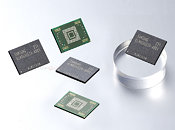Tuesday, September 18th 2012

Samsung Begins Mass Producing World's Highest Density (128GB) Embedded NAND Storage
Samsung Electronics Co., Ltd., the world leader in advanced memory technology, today announced that it has begun volume production of 128-gigabyte (GB) embedded memory for next-generation smartphones, tablets and other mobile devices. Samsung started producing the new 128GB eMMC (embedded multimedia card) Pro Class 1500 in late August, which is only one month after it started delivering eMMC Pro products in 16-, 32- and 64-GB densities, rapidly completing the industry's widest line-up of eMMC products.
"By doubling the highest density of its previous eMMC products, Samsung expects to contribute significantly to a timely release of leading-edge mobile devices," said Wanhoon Hong, executive vice president, Memory Sales & Marketing, Samsung Electronics. "The higher data storage and faster data transmission will bring a range of benefits to users that compare to those of ultra-slim notebook PCs."With 128GB of the new embedded memory storage, mobile handsets and tablet PCs can store up to 15 full HD, 8GB-equivalent video files. Also, the new eMMC fits into an extremely slim 12x16mm FBGA package that nicely accommodates today's sleeker mobile designs. In addition, the new eMMC provides the industry's highest density and highest performance level for an embedded memory chip.
Samsung's eMMC Pro cards read data sequentially at up to 140 megabytes per second (MB/s) and write it at up to 50MB/s, which is five times faster than Class-10 rated external memory cards. For random reading and writing, it can process up to 3500/1500 IOPS (inputs and outputs per second, respectively)*.
The ultra high-speed storage device uses Samsung's 64-gigabit (Gb) NAND memory with a toggle DDR 2.0 interface based on the company's latest 20 nanometer class** process technology. The new eMMC's fully managed NAND comes with its own high performance controller and intelligent flash-management firmware.
The Samsung eMMC Pro Class 1500 supports the JEDEC eMMC v4.5 specification that standardizes the most advanced features to improve performance, efficiency, security and reliability. In being quick to mass produce the industry's most extensive eMMC v4.5 product line-up, Samsung anticipates that the proportion of premium NAND flash in the mobile market will grow even faster.
"By doubling the highest density of its previous eMMC products, Samsung expects to contribute significantly to a timely release of leading-edge mobile devices," said Wanhoon Hong, executive vice president, Memory Sales & Marketing, Samsung Electronics. "The higher data storage and faster data transmission will bring a range of benefits to users that compare to those of ultra-slim notebook PCs."With 128GB of the new embedded memory storage, mobile handsets and tablet PCs can store up to 15 full HD, 8GB-equivalent video files. Also, the new eMMC fits into an extremely slim 12x16mm FBGA package that nicely accommodates today's sleeker mobile designs. In addition, the new eMMC provides the industry's highest density and highest performance level for an embedded memory chip.
Samsung's eMMC Pro cards read data sequentially at up to 140 megabytes per second (MB/s) and write it at up to 50MB/s, which is five times faster than Class-10 rated external memory cards. For random reading and writing, it can process up to 3500/1500 IOPS (inputs and outputs per second, respectively)*.
The ultra high-speed storage device uses Samsung's 64-gigabit (Gb) NAND memory with a toggle DDR 2.0 interface based on the company's latest 20 nanometer class** process technology. The new eMMC's fully managed NAND comes with its own high performance controller and intelligent flash-management firmware.
The Samsung eMMC Pro Class 1500 supports the JEDEC eMMC v4.5 specification that standardizes the most advanced features to improve performance, efficiency, security and reliability. In being quick to mass produce the industry's most extensive eMMC v4.5 product line-up, Samsung anticipates that the proportion of premium NAND flash in the mobile market will grow even faster.

6 Comments on Samsung Begins Mass Producing World's Highest Density (128GB) Embedded NAND Storage
This is a BGA chip. In your phone, eg.